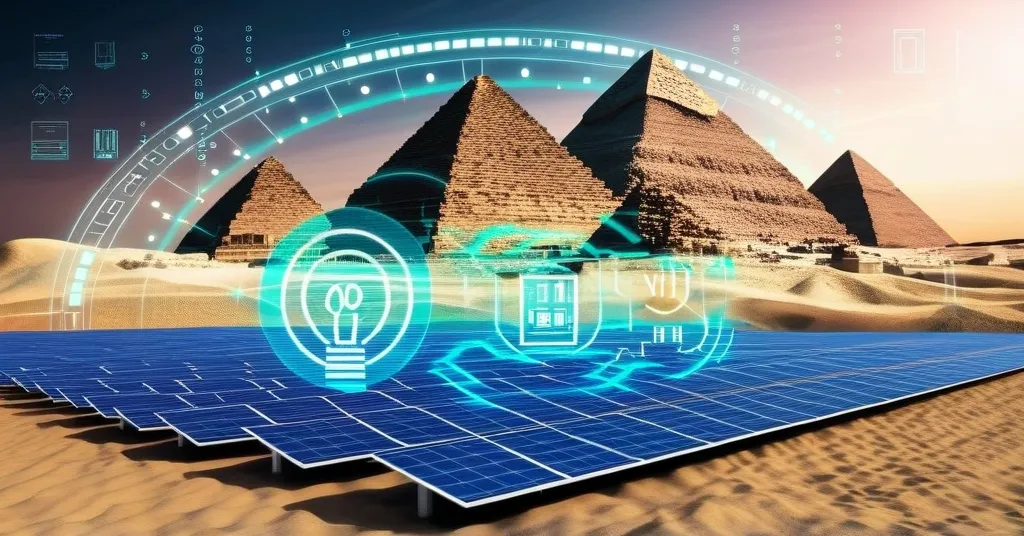Egypt’s AI and IT Leap Forward; Mizuho’s Renewable Energy STO Initiative

Egypt’s Ambitious Leap into Digital Transformation and Mizuho’s Renewable Energy STO
Egypt is charging ahead with an ambitious plan to lead in artificial intelligence and IT, presenting a strategic blueprint to President Abdel Fattah El-Sisi. At the same time, Japan’s Mizuho Securities is making waves in the Security Token Offering (STO) space with a focus on renewable energy.
- Egypt pushes digital strategy with AI and IT focus
- Mizuho Securities launches STO for renewable energy
Egypt’s vision to dominate in the artificial intelligence (AI) and IT sectors is clearly forming through its bold tech plans. The country has laid out a detailed plan to overhaul its communications sector and introduce the next iteration of the National Strategy for Artificial Intelligence, which zeroes in on practical applications. Communications Minister Amr Talaat has been vocal about the necessity of a major upgrade to the internet system to meet global standards, stating, “An overhaul of the current internet infrastructure to meet world-class standards will see Egypt leapfrog its peers in the Middle East.”
But it’s not just about the tech; it’s about the people too. President Sisi is championing a national education drive to cultivate a deep pool of talent in AI and Web3 technologies, ensuring that Egyptian firms have the expertise they need to thrive in this new digital era. This drive involves expanding educational programs and initiatives aimed at preparing the workforce for the demands of the future tech landscape.
On the virtual asset front, Egypt is making significant strides, ranking 14th globally in digital asset adoption according to Chainalysis’s 2023 Global Crypto Adoption Index. This surge in interest is part of a broader trend in the Middle East, where countries are increasingly embracing digital currencies. The Central Bank of Egypt (CBE) is gearing up to launch its own Central Bank Digital Currency (CBDC) by 2024 to enhance financial inclusion and streamline cross-border payments. This move aligns with global efforts, including Egypt’s participation in the mBridge project, a cross-border CBDC initiative with China and other nations.
Across the world in Japan, Mizuho Securities is not sitting idly by. They’re diving into the Security Token Offering (STO) market with a twist—renewable energy. STOs are a method of raising capital using blockchain technology, and Mizuho is partnering with Blue Sky Solar to tokenize revenues from solar power generation facilities. This innovative approach aims to raise funds in a way that also supports sustainable development. Blue Sky Solar’s facilities have the capacity to power around 9,000 households, and through this STO, the company is looking to expand its impact further.
Mizuho’s foray into STOs isn’t just about renewable energy. They’re also exploring blockchain-based digital identity solutions in collaboration with other major Japanese banks like Mitsubishi UFJ Financial Group (MUFG) and Sumitomo Mitsui. This broader engagement with blockchain technology reflects Japan’s growing acceptance of digital securities and its supportive regulatory environment.
While Egypt’s digital ambitions and Mizuho’s STO initiatives are promising, they’re not without their challenges. Egypt must navigate the complexities of implementing a CBDC while ensuring it bolsters financial inclusion without disrupting existing financial systems. Similarly, Mizuho’s STO must comply with Japanese security laws, ensuring clear ownership and risk management for investors.
Yet, the potential benefits are clear. Egypt’s push towards digital transformation could propel it to the forefront of AI and IT leadership in the Middle East, while Mizuho’s STO could pave the way for more sustainable investment opportunities in renewable energy. These initiatives highlight the dynamic interplay between technology, finance, and sustainability, as countries and companies alike navigate the exciting yet challenging landscape of digital transformation and blockchain innovation.
As Egypt and Japan forge ahead with these initiatives, they align with the broader goals of decentralization and financial freedom, core values within the crypto community. These projects embody the principles of effective accelerationism, pushing the boundaries of technology for rapid progress. Bitcoin maximalists might view these developments as steps toward a more decentralized financial ecosystem, though they might also caution about the risks of centralized digital currencies like CBDCs and the potential for regulatory overreach in STOs.
Key Questions and Takeaways
What is Egypt’s plan for digital transformation?
Egypt aims to lead in AI and IT by overhauling its communications sector and deploying a revised National Strategy for Artificial Intelligence focused on real-world applications.
How is Egypt enhancing its AI and Web3 talent pool?
President Sisi has ordered a national education drive to deepen the talent pool for Egyptian firms seeking AI and Web3 experts.
What is the current status of virtual asset adoption in Egypt?
Egypt ranks 14th globally in virtual asset adoption, contributing significantly to the Middle East’s high digital asset adoption rates.
What is the Central Bank of Egypt planning with regard to digital currency?
The Central Bank of Egypt plans to launch a CBDC by 2024 to improve financial inclusion and facilitate cross-border payments.
What is Mizuho Securities’ latest initiative in the STO space?
Mizuho is launching an STO focused on tokenizing renewable energy infrastructure private placement funds in partnership with Blue Sky Solar.
How is Blue Sky Solar involved in Mizuho’s STO?
Blue Sky Solar is partnering with Mizuho to tokenize its infrastructure assets, aiming to raise funds through this new STO model.
What broader blockchain initiatives is Mizuho involved in?
Beyond STOs, Mizuho is developing blockchain-based digital identity solutions in collaboration with other major Japanese banks like MUFG and Sumitomo Mitsui.


